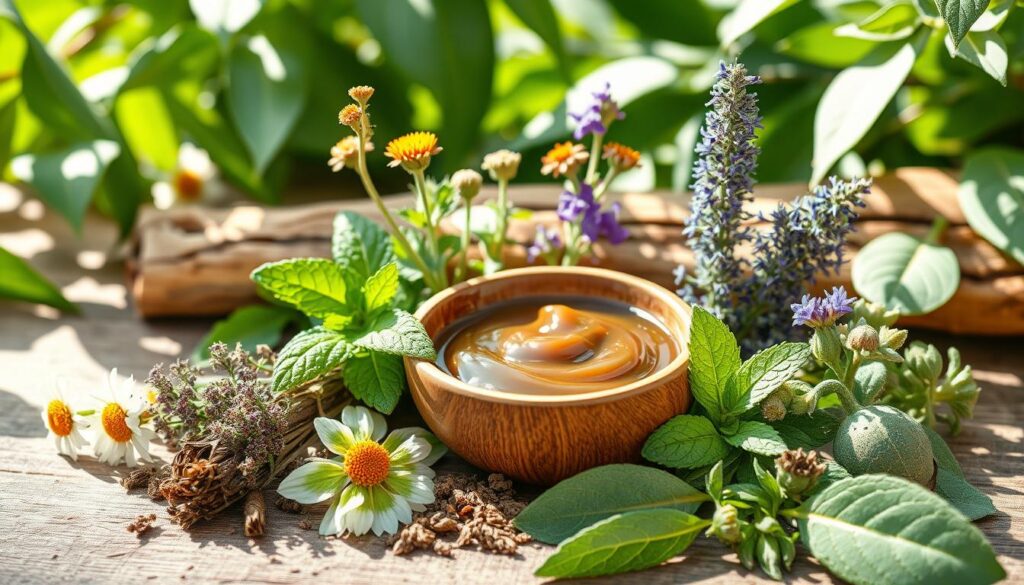Did you know over 90% of Australian adults have gum disease? This is a big problem. It shows we need to take care of our teeth more. This guide will show you how to fight gum disease with natural ways.
It talks about essential oils, herbs, and even Aboriginal medicine. If you have gingivitis or periodontitis, there are easy ways to help. You can keep your gums healthy without going to the dentist all the time.
Key Takeaways
- Discover effective natural remedies to combat gum disease, including essential oils, herbal treatments, and traditional Aboriginal approaches.
- Learn how to identify the signs and stages of gum disease, from gingivitis to periodontitis, and understand the common risk factors.
- Explore dietary changes and nutrient-rich foods that can support optimal gum health and prevent further deterioration.
- Understand the role of antioxidants, particularly vitamin C, in maintaining healthy gum tissue and combating inflammation.
- Discover natural antibacterial mouthwash alternatives and lifestyle modifications that can enhance your oral hygiene routine.
Understanding Gum Disease and Its Stages
Gum disease, also known as periodontal disease, is a common issue that affects the gums and teeth. It has two main stages: gingivitis and periodontitis. Knowing the signs and symptoms of each stage is key to keeping your teeth and gums healthy.
Signs and Symptoms of Gingivitis
Gingivitis is the early stage of gum disease. It causes inflammation and irritation of the gums. The main signs include:
- Reddish, swollen, or tender gums
- Bleeding gums, especially during brushing or flossing
- Bad breath or a persistent unpleasant taste in the mouth
- Receding gums, which can make the teeth appear longer
Progression to Periodontitis
If gingivitis is not treated, it can turn into periodontitis. In this stage, the gums and bone that support the teeth are damaged. This leads to:
- Deeper pockets between the gums and teeth
- Loose or shifting teeth
- Tooth loss
Risk Factors and Common Causes
Several factors can increase your risk of gum disease. These include poor oral hygiene, smoking, diabetes, hormonal changes, certain medications, and genetics. Good teeth and gum care practices can help prevent periodontal disease.
“Proper oral hygiene and timely intervention are crucial in managing gingivitis treatment and preventing the development of more serious periodontal disease.”
Essential Oils for Gum Health Maintenance
Keeping your gums healthy is key for a good smile. Research shows some essential oils can help a lot. They offer a natural way to care for your gums, alongside dental treatments.
Tea tree oil is known for fighting bacteria and reducing swelling. Using it as a mouth rinse can cut down on plaque and soothe sore gums. Peppermint oil also helps, with its cool scent and calming effects, making gums healthier.
Eucalyptus oil is great for gum health too. It boosts blood flow and eases irritation. Adding these oils to your oral care routine can keep your gums strong and healthy.
“Essential oils offer a natural and holistic approach to gum care, complementing traditional dental treatments.”
Remember, essential oils are powerful but should be used carefully. Always follow advice from a healthcare expert. By using nature’s best, you can get healthier gums and a brighter smile.
Natural Remedies for Gum Disease: Traditional Approaches
Dealing with gum disease can be helped by a mix of dental care and natural treatments. For years, people have used salt water rinses, oil pulling, and herbal poultices to keep gums healthy and heal them.
Salt Water Rinses
A salt water rinse can be a game-changer for gum disease. Salt’s anti-inflammatory and antibacterial qualities reduce swelling, kill bacteria, and aid in healing. To do it, mix a teaspoon of salt in warm water, swish it in your mouth for 30 seconds, and then spit it out. Do this several times a day for the best results.
Oil Pulling Methods
Oil pulling is an old Ayurvedic method. You swish a tablespoon of oil (like coconut, sesame, or olive oil) in your mouth for 10-20 minutes. It pulls out toxins, reduces plaque, and fights gum inflammation. Adding oil pulling to your daily routine can help with periodontal disease and holistic oral health.
Herbal Poultices
Herbal poultices can soothe and heal gum infections. Herbs like aloe vera, chamomile, and turmeric are anti-inflammatory and antimicrobial. Make a paste from the herbs, apply it to your gums, and leave it on for 15-20 minutes before rinsing.
Using these traditional methods in your oral care can help manage and even reverse gum disease symptoms. Always talk to your dentist to get the best results for your holistic oral health.
Powerful Herbal Solutions for Gum Inflammation
The natural world is full of herbal remedies for gum inflammation. Chamomile and green tea are just a few examples. They offer relief from gum disease discomfort.
Chamomile is a hero against gum inflammation. This flower has been used for centuries to soothe gums. It has compounds that fight inflammation and kill bacteria.
Green tea is another powerful herb. It’s full of compounds that stop bad bacteria and heal gums. Drinking green tea or using it as a rinse can help a lot.
Aloe vera is also great for gums. It’s soothing and helps reduce swelling. Using aloe vera on gums can be a gentle way to keep them healthy.
Adding these natural tooth and gum supplements to your routine can help. Always talk to your doctor before trying new herbal remedies. Follow the instructions carefully for the best results.

“Harnessing the power of nature’s gifts can be a transformative step in achieving and maintaining healthy gums.”
Dietary Changes to Support Oral Health
Keeping your gums healthy is more than just brushing your teeth. Eating the right foods can also help a lot. Let’s look at the key changes in your diet that can help your gum disease prevention and holistic gum health.
Nutrient-Rich Foods for Gum Health
Eating foods rich in nutrients can greatly improve your gum health. Here are some foods to focus on:
- Leafy greens like spinach and kale, which are packed with vitamins A and C
- Citrus fruits, such as oranges and lemons, known for their high vitamin C content
- Fatty fish like salmon and mackerel, which are excellent sources of omega-3 fatty acids
- Whole grains, which provide essential B vitamins and minerals
- Nuts and seeds, including almonds and chia seeds, for their anti-inflammatory properties
Foods to Avoid with Gum Disease
Some foods can help your gums, while others can harm them. It’s wise to eat less of:
- Sugary and refined carbohydrates, which feed harmful oral bacteria
- Processed and fried foods, which can contribute to inflammation
- Acidic beverages like soda and coffee, which can erode tooth enamel
Supplements for Gum Protection
Along with a healthy diet, taking natural tooth and gum supplements can also help. Some of the best supplements include:
- Coenzyme Q10, which has been shown to improve gum health and reduce inflammation
- Probiotics, which can help restore the balance of beneficial oral bacteria
- Vitamin C, a powerful antioxidant that supports collagen production in the gums
By making smart food choices and using the right supplements, you can actively prevent gum disease prevention. This will help keep your teeth and gums healthy.
Traditional Aboriginal Medicine for Gum Care
In Australia, the traditional knowledge of Indigenous people offers a natural way to keep gums healthy. For ages, Aboriginal communities have used native plants to fight dental problems. This approach is a natural solution that goes beyond modern medicine.
Aboriginal healers believe that mouth health is linked to body health. They have learned to use natural remedies to care for gums. This shows a deep understanding of how to keep the mouth healthy.
Potent Plants for Gum Health
Many native Australian plants are known for their gum-healing powers. Tea tree is famous for fighting bacteria and reducing inflammation. Eucalyptus and lemon myrtle are also used to calm inflamed gums and improve oral health.
| Native Plant | Active Compounds | Traditional Uses |
|---|---|---|
| Tea Tree | Terpenes, Flavonoids | Anti-inflammatory, Antimicrobial, Gum disease treatment |
| Eucalyptus | Cineole, Tannins | Gum inflammation relief, Antiseptic properties |
| Lemon Myrtle | Citral, Limonene | Gum health maintenance, Oral hygiene support |
Using these natural remedies can help Australians keep their gums healthy. It’s a way to embrace traditional Aboriginal medicine for better dental health.

“The health of the mouth is the gateway to the health of the body. By understanding and respecting the traditional wisdom of our First Nations people, we can unlock a new era of holistic oral health.”
The Role of Vitamin C and Other Antioxidants
Keeping your gums healthy is key for good oral health. Vitamin C and other antioxidants play a big role in this. Vitamin C is especially important for strong gums and preventing gum disease.
Natural Sources of Vitamin C
Vitamin C is easy to find in many foods. Oranges, lemons, and grapefruits are great sources. Berries, tomatoes, leafy greens, and bell peppers are also full of it. Eating these foods can help your gums stay strong and fight off bad bacteria.
Antioxidant Benefits for Gum Tissue
- Vitamin C protects gum tissue from damage and inflammation.
- Vitamins E, CoQ10, and green tea extract also help prevent gum disease and improve oral health.
- Antioxidants fight off free radicals, which can harm gums and slow healing.
Eating foods and taking supplements rich in antioxidants can help keep your gums healthy. This proactive approach supports your gums’ health and resilience.
Natural Antibacterial Mouthwash Alternatives
Looking for natural ways to fight gum disease? There are many good alternatives to store-bought mouthwashes. These natural mouth rinses use herbs and plants to keep your mouth healthy.
Neem-based mouthwash is a great choice. Neem is known for its strong antibacterial and anti-inflammatory effects. To make it, boil neem leaves in water, let it cool, and rinse with it every day.
Sage-infused mouthwash is another good option. Sage helps reduce gum swelling and kills bacteria. To make it, steep dried sage leaves in hot water, strain, and rinse with it daily.
For a mouthwash that feels warm, try cinnamon-based mouthwash. Cinnamon fights bacteria and reduces inflammation. To make it, simmer cinnamon sticks in water, strain, and rinse with it.
| Natural Mouthwash Ingredient | Targeted Benefits |
|---|---|
| Neem | Antimicrobial, anti-inflammatory |
| Sage | Antiseptic, astringent |
| Cinnamon | Antibacterial, anti-inflammatory |
Using these natural mouth rinses daily can help keep your gums healthy. They offer a natural way to fight gum disease and promote overall oral health.
“Natural remedies offer a holistic approach to maintaining gum health, empowering individuals to take control of their oral wellbeing.”
Lifestyle Modifications for Better Gum Health
Keeping your gums healthy is more than just brushing and flossing. Your lifestyle choices play a big role in gum health. Making a few simple changes can help prevent gum disease and keep your mouth healthy for the long term.
Stress Management Techniques
Too much stress can harm your gums. Stress hormones can make your gums more likely to get gum disease. Try these stress-reducing activities every day:
- Meditation and deep breathing exercises
- Regular exercise and physical activity
- Engaging in relaxing hobbies
- Seeking support from friends and loved ones
Importance of Proper Hydration
Drinking enough water is key for oral hygiene alternatives and holistic gum health. Water helps make saliva, which is important for neutralizing acids and removing food particles. It also stops harmful bacteria from building up in your mouth.
“Drinking enough water throughout the day is a simple yet effective way to keep your gums healthy and prevent gum disease.”
Try to drink at least 8 cups (2 litres) of water a day. If you’re active or live in a hot place, drink more. Staying hydrated is a big help in preventing gum disease.
Prevention Strategies Using Natural Methods
Keeping your gums healthy is easy. Just add natural preventive steps to your daily life. This way, you can fight off gum disease and keep your mouth in great shape. Focus on caring for your gums from the inside out.
Learning to brush right is key. Use a soft-bristled toothbrush to gently massage your gums in circles. This boosts blood flow and removes plaque. Flossing regularly also helps, getting rid of bacteria in hard spots.
- Choose toothpaste and mouthwash without fluoride. Look for ones with tea tree oil, aloe vera, and essential oils for gum health.
- Try oil pulling, an ancient Ayurvedic method. Swish coconut or sesame oil in your mouth to kill bacteria and strengthen gums.
- Eat foods rich in nutrients, like fruits, veggies, and omega-3s. These help your teeth and gum care from the inside.
By using these holistic oral health tips, you can protect your gums. Enjoy a lifetime of healthy, bright smiles.
Integrating Natural Remedies with Professional Care
Keeping your gums healthy needs a mix of natural remedies and dental care. Natural methods can work well against gum disease. But, sometimes, you need to see a dentist. Knowing when to use natural treatments and when to go to the dentist is important for good oral health.
When to Seek Professional Treatment
If your gum disease is severe or natural treatments don’t help, you should see a dentist. Periodontitis, a serious gum disease, might need special treatments like scaling or surgery. A dentist can give you the right treatment and watch your gums to stop them from getting worse.
Complementary Natural Approaches
After seeing a dentist, you can add natural remedies to help your gums heal. Using a mix of dental care and natural treatments like essential oils and herbs can make your gums healthier. This approach can make your dental care more effective and keep your gums healthy for longer.





